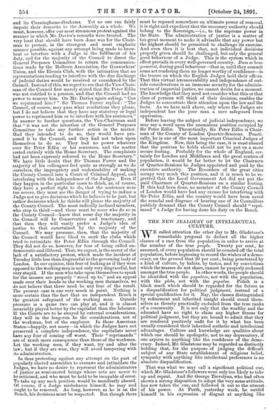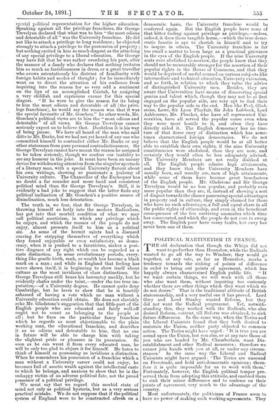THE NEW JEALOUSY OF INTELLECTUAL CULTURE. Nv -E called attention the
other day to Mr. Gladstone's remarkable proposal to deduct all the higher classes of a race from the population in order to arrive at the number of the true people. Twenty per cent., he assumed, of every population should be counted off the total population, before beginning to record the wishes of a demo- cracy, on the ground that 20 per cent., being penetrated by a kind of culture, by habits, by tastes, and by convictions which the masses do not share, cannot be properly reckoned amongst the true people. In other words, the people should be identified with the populace, not with the population, with the plebs, not with the populus. Polish is a black mark which should be regarded for the future as a disqualification for political judgment, instead of a special qualification for it. Nay, the classes, distinguished by refinement and inherited insight should count them- selves as thereby practically excluded from the true ranks of a community. It is not only that the wealthy and the educated have no right to claim any higher fitness for political judgment, but they are bound to admit that they are rendered positively unfit for it by what has been usually considered their inherited aesthetic and intellectual advantages. Culture and knowledge are qualities about which one should be apologetic, not to say deprecatory, if one aspires to anything like the confidence of the demo- cracy. Indeed, Mr. Gladstone may be regarded as distinctly holding that, for the purpose of judging the difficult subject of any State establishment of religious belief, sympathy with anything like intellectual preferences is an absolute disqualification.
That was what we may call a significant political cue, which Mr. Gladstone's followers were only too likely to take up and repeat. And• Sir George Trevelyan, who had often shown a strong disposition to adopt the very same attitude, has now taken the cue, and followed it out to the utmost of his power. At Perth, yesterday week, he outdid himself in his expression of disgust at anything like special political representation for the higher education. Speaking against all the privilege franchises, Sir George Trevelyan declared that what was to him " the most odious and detestable of all " was the University franchise. He did not like to attach a privilege to long residence ; he objected strongly to attach a privilege to the possession of property ; but nothing excited in him so much disgust as the attaching of any special privilege to a liberal education. Sir George may have felt that he was rather overdoing his part, after the manner of a dandy who declares that nothing irritates him so much as fastidiousness in dress, or a great traveller who avows ostentatiously his distrust of familiarity with foreign habits and modes of thought ; for he immediately went on to divert the attention of his audience from inquiring into the reason for so very odd a sentiment on the lips of an accomplished Cantab, by assigning a very childish and capricious excuse for this special disgust. " If he were to give the reason for its being to him the most odious and detestable of all [the privi- lege franchises], he would say the reason was that it was the special favourite of Mr. Goschen." In other words, Mr. Goschen's political views are to him the " most odious and detestable " of all views. Sir George Trevelyan cannot seriously expect us to believe that. Doubtless it is his way of being jocose. We have all heard of the man who said ditto to Mr. Burke, but we had not yet heard of any one who .committed himself to contradict either Mr. Burke or any other statesman from pure personal contradictiousness. Sir George Trevelyan cannot have meant the reason he assigned to be taken seriously, though we confess our inability to see any humour in the joke. It must have been an uneasy device for withdrawing attention from the singular spectacle of a literary man, with a special University flavour about his own writings, showing so passionate a jealousy of University culture. The Chancellor of the Exchequer has no doubt a far sounder and more lucid and consistent political mind than Sir George Trevelyan's. Still, it is evidently a bad joke to suggest that the latter finds any political inclination of Mr. Goschen's a positive source of disinclination, much less detestation.
The truth is, we fear, that Sir George Trevelyan, in throwing himself so hotly into the modern Radicalism, has got into that morbid condition of what we may call political asceticism, in which any privilege which he enjoys, and which the masses of the people do not enjoy, almost presents itself to him as a political sin. As some of the hermit saints' had a diseased craving for stripping themselves of everything which they found enjoyable or even satisfactory, so demo- cracy, when it is pushed to a fanaticism, makes a posi- tive disgrace of any right which can be regarded as a caste distinction. In some revolutionary periods, every- thing like gentle birth, rank, or wealth has become a black mark on a man ; and while in England that feeling has never shown itself, it is beginning to show itself about culture as the most invidious of class distinctions. Sir George Trevelyan still bears his baronetcy meekly, but he evidently chafes under the taint,—under the too true im- putation,—of a University degree. He cannot quite deny Cambridge, but he loves to show that he is heartily ashamed of having a vote which no man without a University education could obtain. He does not slavishly echo Mr. Gladstone's suggestion that that fifth-part of the English people who are educated and fairly well-off ought not to count as belonging to the people at all ; but he fixes on the particular fancy franchise which he regards as most objectionable to the plain working man, the educational franchise, and describes it as so odious and detestable to him, that no one in future will be able to charge him with taking the slightest pride or pleasure in its possession. So soon as he can wrest it from every educated man, he will be only too glad to abjure it for himself. He hates to think of himself as possessing 'so invidious a distinction. When he remembers his possession of a franchise which a man without a University career could not enjoy, he becomes full of ascetic wrath against the intellectual caste to which he belongs, and anxious to show that he is the unhappy victim of an adverse political fate, not the proud possessor of a political privilege. We must say that we regard this morbid state of mind not only as political hysteria, but as a very serious practical mistake. We do not suppose that if the political system of England were to be constructed afresh on a democratic basis, the University franchise would be conferred again. But the English people have none of that bitter feeling against privilege as privilege,—unless, indeed, it does them tangible harm,—which the true demo- cratic fanatic is apt to cherish in himself. and to try to inspire in others. The University franchise is far too small a matter to loom large as a practical grievance in the eyes of the English people. If the nine University seats were abolished to-morrow, the people know that they should not be measurably stronger for the assertion of their popular rights in the House of Commons, and that they would be deprived of useful counsel ou various subjects like intermediate and technical education, University extension, and so forth, in relation to which they value the advice of distinguished University men. Besides, they are aware that Universities have means of discovering special genius and talent which, though they may not be at first engaged on the popular side, are very apt to find their way to the popular side in the end. Men like Peel, Glad- stone, Lowe, Sir Lyon Playfair, Sir John Lubbock, Lord Ashbourne, Mr. Plunket, who have all represented Uni- versities, have all served the popular cause even when they were most hostile to it, and often they have directly aided it. The English democracy has no tinc- ture of that fierce envy of distinction which has some- times characterised foreign democracies. We do not believe that the English people would be at all better able to establish their own rights, if the nine University constituencies were abolished, than they are now, and certainly they would often be less adequately advised. The University Members are not really disliked at all. The English people admire high attainments, and they know that the University Members have usually been, and usually are, men of high attainments, while some of them have become great benefactors of the English people. Mr. Gladstone and Sir George Trevelyan would be no less popular, and probably even more popular than they are, if, instead of showing a sort of disgust towards the classes possessing special advantages in property and in culture, they simply claimed for those who have no such advantages, a full and equal share in all the public rights of citizenship, and even in the beneficent consequences of the few sdrviving anomalies which time has consecrated, and which the people do not care to sweep away. The English poor have many faults, but envy has never been one of them.



































 Previous page
Previous page